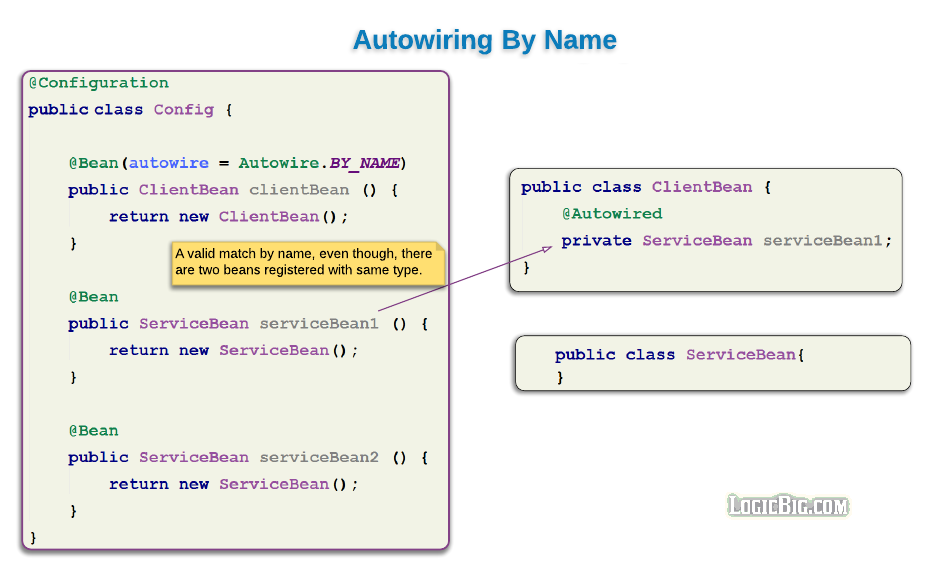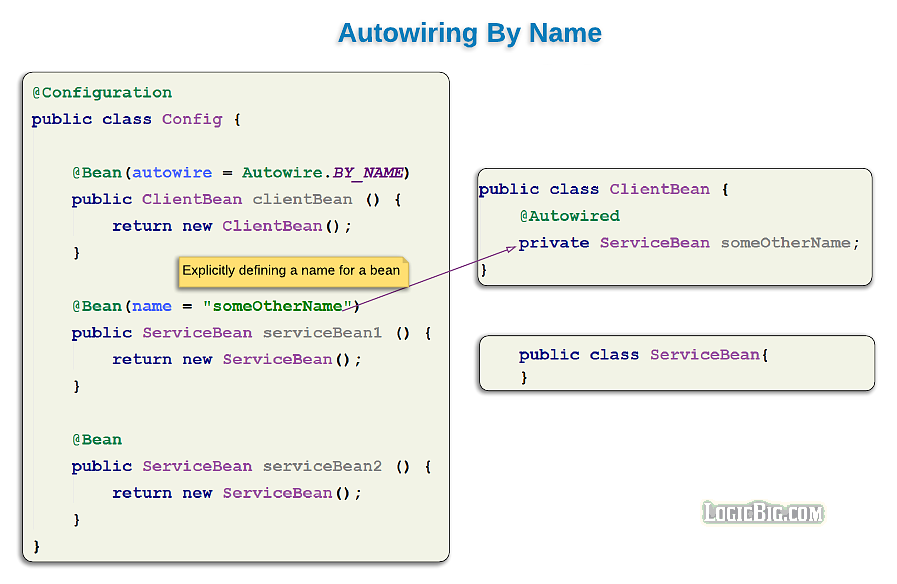Note that @Bean#autowire attribute was deprecated in version 5.1, that was because @Bean factory method argument resolution and @Autowired processing supersede name/type-based bean property injection. In Spring 6.x this attribute has been completely removed.
In this mode, beans are matched by names. Names are nothing but the identifier of the beans.
We have to use @Autowired at the injection point in this mode.
Using default bean name
In the following example, even though there are two beans available of same type, there will still be a valid match for the injection point field Service serviceBean1. That's because by default, the beans are registered as the 'method name' annotated with @Bean unless we use the 'name' element of @Bean.

Using explicit bean name
We can also specify an explicit bean name using 'name' element of the @Bean

We can use setter based or constructor based autowiring as well, still the filed name (bean property) has to match.
We would typically want to use this mode of wiring, if there are multiple beans available of same type which likely to cause NoUniqueBeanDefinitionException (thrown for both Autowire.NO and Autowire.BY_TYPE modes). Using bean's name (the identifier) is a way to resolve ambiguity.
We can also use @Qualifier instead of matching by 'name'. There, we have to use the same qualifier at the injection point. In that case using the mode won't be significant any more because we will be matching by a qualifier not by name.
Examples
Using default bean name
package com.logicbig.example;
import org.springframework.beans.factory.annotation.Autowire;
import org.springframework.beans.factory.annotation.Autowired;
import org.springframework.context.annotation.AnnotationConfigApplicationContext;
import org.springframework.context.annotation.Bean;
import org.springframework.context.annotation.Configuration;
public class AutowireByName {
public static void main (String[] args) {
AnnotationConfigApplicationContext context = new
AnnotationConfigApplicationContext(Config.class);
ClientBean bean = context.getBean(ClientBean.class);
bean.doSomething();
}
@Configuration
public static class Config {
@Bean(autowire = Autowire.BY_NAME)
public ClientBean clientBean () {
return new ClientBean();
}
@Bean
public ServiceBean serviceBean1 () {
return new ServiceBean("Service bean 1");
}
@Bean
public ServiceBean serviceBean2 () {
return new ServiceBean("Service bean 2");
}
}
private static class ClientBean {
@Autowired
private ServiceBean serviceBean1;
public void doSomething () {
System.out.println(serviceBean1.getMsg());
}
}
private static class ServiceBean {
private String msg;
public ServiceBean (String msg) {
this.msg = msg;
}
public String getMsg () {
return msg;
}
}
}OutputService bean 1
Specifying name via @Bean#name
package com.logicbig.example;
import org.springframework.beans.factory.annotation.Autowire;
import org.springframework.beans.factory.annotation.Autowired;
import org.springframework.context.annotation.AnnotationConfigApplicationContext;
import org.springframework.context.annotation.Bean;
import org.springframework.context.annotation.Configuration;
public class AutowireByName2 {
public static void main (String[] args) {
AnnotationConfigApplicationContext context = new
AnnotationConfigApplicationContext(Config.class);
ClientBean bean = context.getBean(ClientBean.class);
bean.doSomething();
}
@Configuration
public static class Config {
@Bean(autowire = Autowire.BY_NAME)
public ClientBean clientBean () {
return new ClientBean();
}
@Bean(name = "someOtherServiceBean")
public ServiceBean serviceBean1 () {
return new ServiceBean("Service bean 1");
}
@Bean
public ServiceBean serviceBean2 () {
return new ServiceBean("Service bean 2");
}
}
private static class ClientBean {
private ServiceBean someOtherServiceBean;
@Autowired
public void setSomeOtherServiceBean (ServiceBean serviceBean) {
this.someOtherServiceBean = serviceBean;
}
public void doSomething () {
System.out.println(someOtherServiceBean.getMsg());
}
}
private static class ServiceBean {
private String msg;
public ServiceBean (String msg) {
this.msg = msg;
}
public String getMsg () {
return msg;
}
}
}OutputService bean 1
Using @Qualifier
package com.logicbig.example;
import org.springframework.beans.factory.annotation.Autowire;
import org.springframework.beans.factory.annotation.Autowired;
import org.springframework.beans.factory.annotation.Qualifier;
import org.springframework.context.annotation.AnnotationConfigApplicationContext;
import org.springframework.context.annotation.Bean;
import org.springframework.context.annotation.Configuration;
public class AutowireByName3 {
public static void main (String[] args) {
AnnotationConfigApplicationContext context = new
AnnotationConfigApplicationContext(Config.class);
ClientBean bean = context.getBean(ClientBean.class);
bean.doSomething();
}
@Configuration
public static class Config {
@Bean(autowire = Autowire.BY_NAME)
public ClientBean clientBean () {
return new ClientBean();
}
@Bean
public ServiceBean serviceBean1 () {
return new ServiceBean("Service bean 1");
}
@Bean(name = "myService")
public ServiceBean serviceBean2 () {
return new ServiceBean("Service bean 2");
}
}
private static class ClientBean {
private ServiceBean serviceBean;
@Autowired
@Qualifier("myService")
public void setServiceBean(ServiceBean serviceBean) {
this.serviceBean = serviceBean;
}
public void doSomething () {
System.out.println(serviceBean.getMsg());
}
}
private static class ServiceBean {
private String msg;
public ServiceBean (String msg) {
this.msg = msg;
}
public String getMsg () {
return msg;
}
}
}OutputService bean 2
Using @Qualifier at both injection point and at bean definition
package com.logicbig.example;
import org.springframework.beans.factory.annotation.Autowire;
import org.springframework.beans.factory.annotation.Autowired;
import org.springframework.beans.factory.annotation.Qualifier;
import org.springframework.context.annotation.AnnotationConfigApplicationContext;
import org.springframework.context.annotation.Bean;
import org.springframework.context.annotation.Configuration;
public class AutowireByName4 {
public static void main (String[] args) {
AnnotationConfigApplicationContext context = new
AnnotationConfigApplicationContext(Config.class);
ClientBean bean = context.getBean(ClientBean.class);
bean.doSomething();
}
@Configuration
public static class Config {
@Bean(autowire = Autowire.BY_NAME)
public ClientBean clientBean () {
return new ClientBean();
}
@Bean
public ServiceBean serviceBean1 () {
return new ServiceBean("Service bean 1");
}
@Bean
@Qualifier("myService")
public ServiceBean serviceBean2 () {
return new ServiceBean("Service bean 2");
}
}
private static class ClientBean {
private ServiceBean serviceBean;
@Autowired
@Qualifier("myService")
public void setServiceBean(ServiceBean serviceBean) {
this.serviceBean = serviceBean;
}
public void doSomething () {
System.out.println(serviceBean.getMsg());
}
}
private static class ServiceBean {
private String msg;
public ServiceBean (String msg) {
this.msg = msg;
}
public String getMsg () {
return msg;
}
}
}OutputService bean 2
Example ProjectDependencies and Technologies Used: - spring-context 5.0.20.RELEASE (Spring Context)
Version Compatibility: 3.2.3.RELEASE - 5.3.39
- JDK 8
- Maven 3.8.1
|